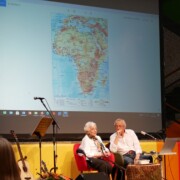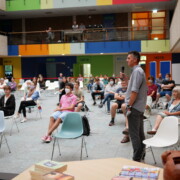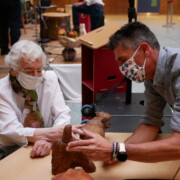von Lutz Kliche

For many years, I have been traveling with Ruth throughout Germany once or twice a year. On our trips, we read in schools, educational institutions and book stores. Most of the time, Ruth talks about her life, her experiences as a Jewish victim of discrimination and anti-semitism in Nazi-Germany and as a witness, a witness to history in the best sense of the word, of racism and discrimination of the non-white population by the white minority in South Africa, the country where she fled to with her family. I usually moderate these talks and help Ruth reading the respective text fragments from her autobiography “A Path through Hard Grass”, sometimes parts of some of her other books, most of all “My Sister Sara”, the novel which has already been chosen twice as reading material for the exams in 10th grade of middle schools in the state of Baden-Württemberg.
Because of Covid-19, we had to cancel our spring tour and could only do a few virtual readings on the internet. Nevertheless, we were able to travel all through the month of September, and I believe we were well able to make up for the events that had to be canceled in the spring.
Ruth and I met in Hamburg where we started off right away with our first reading on September 4th at the Lessing-Stadtteilschule in Hamburg-Harburg. Inspite fo Covid and social distancing, we sat in front of a well filled expectant auditorium of older students many of whom obviously had a Muslim family background, easily to be observed by the scarves the girls were wearing. This of course led to an exciting discussion in the course of which I as the moderator was once again aware of how important these readings are: with her long life and all her experience, Ruth logically has a huge ethical and factual authority, and it was wonderful to see with how much respect and warmth especially the young Muslims reacted to this old Jewish lady who could well have been their great-grandmother. What a good start into our tour!
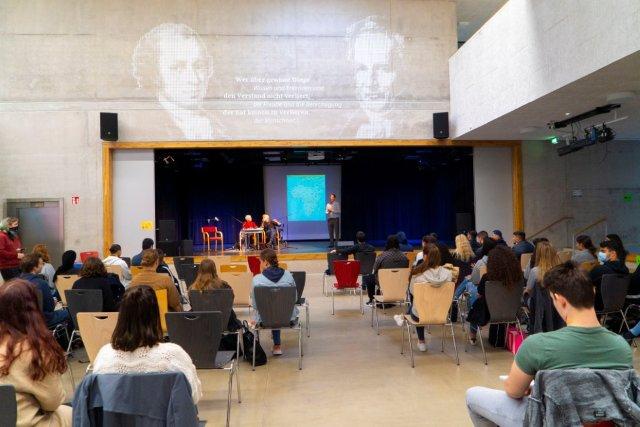
From Hamburg we drove on to Lüdinghausen where Ruth had lived for many years and was received by her old friends with open arms like always. For me, it is always great to see how much she is being loved there! Besides the tweo school readings at the Theodor-Heuss-Gymnasium in Recklinghausen and the Canisianum in Lüdinghausen, Josefine and Konrad Kleyboldt had invited the friends for coffee, and the living room was hardly big enough for the crowd that came. Ruth always says that she feels at home where she feels understood by good friends, and according to that, Lüdinghausen without any doubt is home for her.
In Lüdinghausen, Ruth also gave a long video-interview for the friends from “exile e. V.”, the agency which has been organizing Ruth’s school readings for years and will be able to prepare more readings with that material.
From Lüdinghausen, we were off to Garbsen in the vicinity of Hannover where we held three readings in two days at the “Integrierte Gesamtschule”, all of them well prepared by Ms Wesemann-Mutz and her colleagues.
If Lüdinghausen is a place where Ruth can feeld at home, so is Sulzbach near Aschaffenburg, the next stop on our way. Our hosts there were Anni Kropf and Günter Springer-Kropf, and in addition to two school readings, the new students of the Ruth-Weiss-Realschule Aschaffenburg and their parents had a chance, for the first time, to meet with the name giver of their school. The many questions they had led to a lively discussion, they were all very impressed and proud to be a student at the Ruth-Weiss-Realschule. Three classes which because of the Corona-rules could not take part, sent marvelous video messages. At the Hans-Seidel-Gymnasium, the focus of Ruth’s reading was apartheid in South Africa.
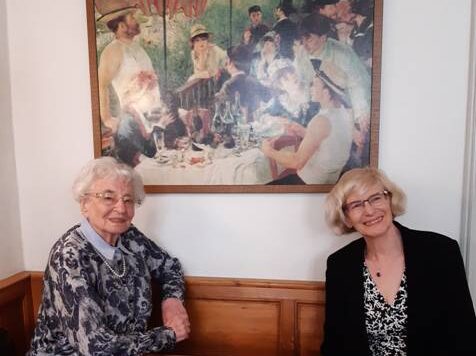
Just like in Lüdinghausen, in Aschaffenburg there was also a number of private meetings with good. Old friends. A special highlight was the visit of Professor Vietor-Engländer as a representative of the board of “Exil-PEN”, the organization of German writing authors abroad. Having lunch together in an old Aschaffenburg restaurant was a good opportunity for an extensive conversation.
Aschaffenburg was also the departure point for a day trip to Homburg an der Saar and a reading at the Johanneum boarding school which took place on a beautiful late summer afternoon. The fabulous sunny weather made it even more remarkable that under voluntary assistance, so many young people and some of their parents had found their way to the school auditorium and participated with great attention and a host of good questions.
Even though each and every reading was special and a highlight in itself, the reading at the “Documentation Center Nazi Party Rally Grounds“ in Nürnberg, the ideological epicenter of Nazi terror, so to speak, was a very special highlight. Astrid Betz, member of the academic staff of the documentation center, had very well prepared the evening, and that was why inspite of necessary Corona-restrictions, around 50 people had come to listen to Ruth speak about the topic of racism: The activity had been announced in the context of the 85th anniversary of the Nürnberg race laws which deprived Germans of Jewish faith of their political rights as citizens and one of which was decreed under the horrific, the cruel name “Law for the Protection of German Blood and German Honour”. It was impressive to hear how Ruth established the connection to the racial politics of th South African Apartheid regime which adopted these laws to a large extent and took them to their extreme: In its extremely exaggerated form, racial discrimination in Apartheid South Africa, said Ruth, seemed like a kind of “absurd theater”.
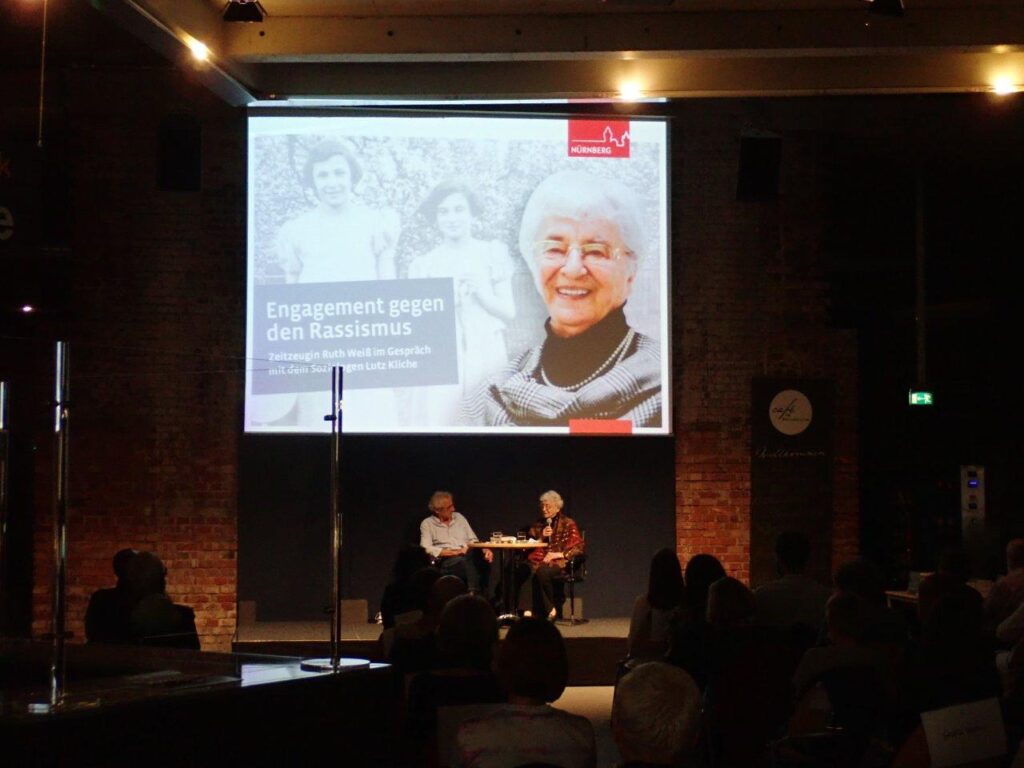
Our stay in Nürnberg also offered the possibility of en extensive interview with Bavarian Radio, led by journalist Barbara Bogen. It turned out to be a fascinating conversation which can be listened to here.
From Nürnberg, we drove off to Dresden, our host there being the Gesellschaft für christlich-jüdische Zusammenarbeit (“Society for Christian-Jewish Cooperation”). Its members Anne Gnüchtel, Hildegart Stellmacher and Jakoba Schönbrodt had organized a very well attended evening reading at the café of the Dreikönigskirche.
After Dresden, a week in Brandenburg near Berlin, was on the schedule. There, the “Regionale Arbeitsstelle für Bildung, Integration und Demokratie” (Regional Office for Education, Integration and Democracy), represented by Jörg Stopa, had organized again and for the fifteenth time a week of school readings, five great and very different readings in and around Brandenburg’s capital city Potsdam, for instance at Humboldt Gymnasium, and the Wolkenberg-Gymnasium in Michendorf. We finished the week with an open-air-reading at the KiJu – Haus der Kinder, Jugend und Familie in Brandenburg an der Havel where we not only had the state tv-channel RBB and other tv-channels, but also the education minister of the State of Brandenburg, Ms Britta Ernst, as an attentive listener.
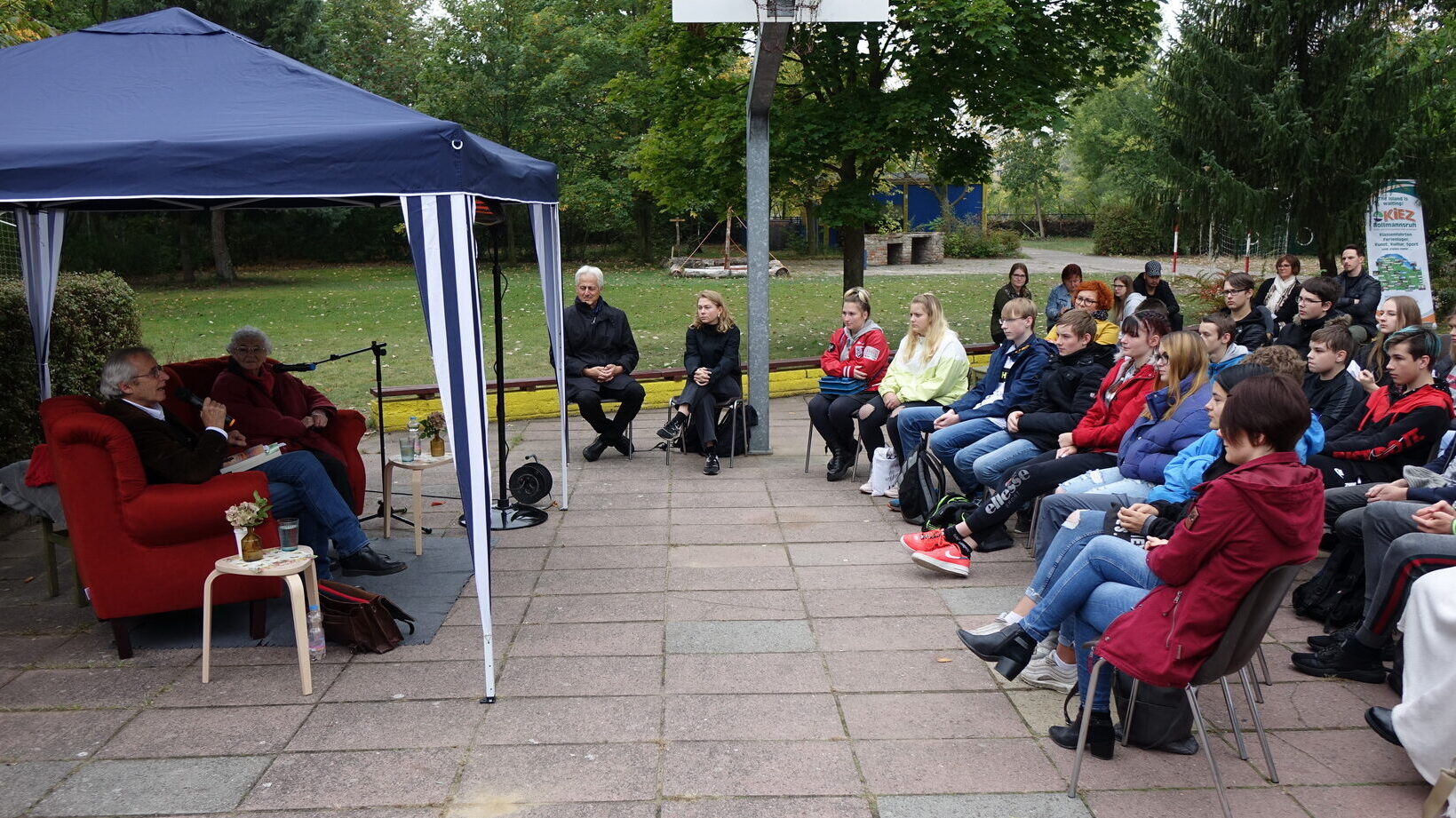
From Potsdam, it was just a stone’s throw to Berlin where the weekend was spent meeting old friends, companions and representatives of organizations and foundations. All of this brought inspiring and productive conversations with many good ideas and plans for the work of our Ruth-Weiss-Gesellschaft.
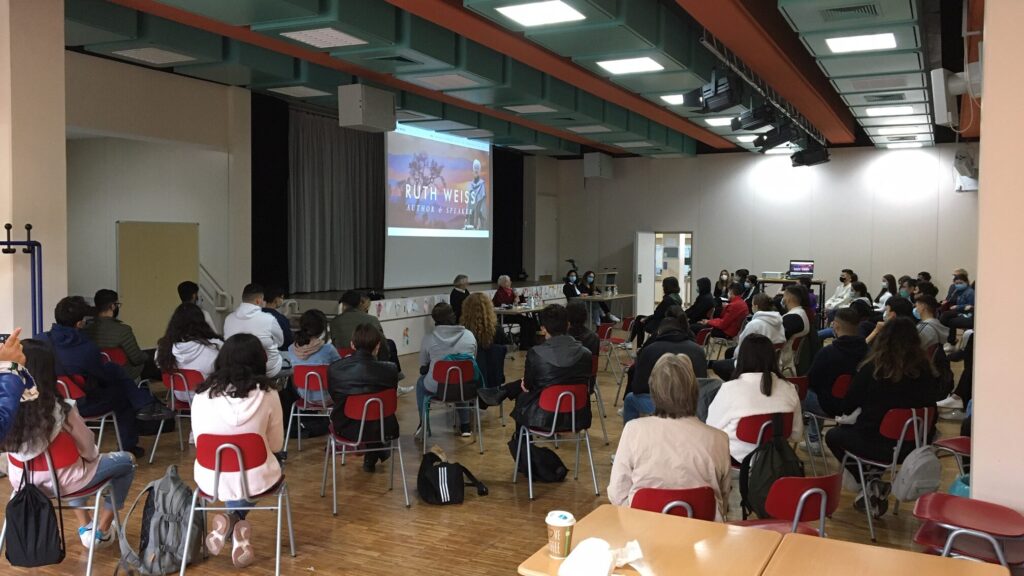
It was at our last reading at the Carl-v.-Ossietzky-Gemeinschaftsschule in Berlin Kreuzberg that Ruth answered one of the questions from the students in a way she had already done this before on our tour and which gave this report its title:
When she returned to Germany and the beginning of the first decade of this century to once again live in the country of her birth, she did so convinced that this country hat changed and no longer was a country of nazis, racists and anti-Semites. She found this confirmed in the Welcoming-culture of 2015, in Angela Merkel’s “Wir schaffen das!” which is something like a “Yes, we can!”. But in the growing xenophobia and anti-Semitism which find their expression in terrorist attacks like the one at the synagogue in Halle where the target were people fo Jewish faith and at Hanau, where the victims were Muslims, Ruth sees a dangerous development:
“Yes, I am worried!”, she says outright.
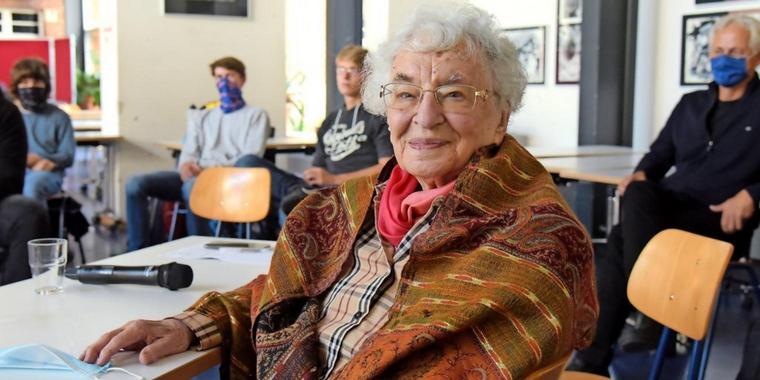
And it is this dangerous development which makes Ruth’s testimonial and her clear stance against any form of racism, discrimination and intolerance towards the unknown foreign so important! Let’s hope that we will have a chance to travel, read and talk many more times!

